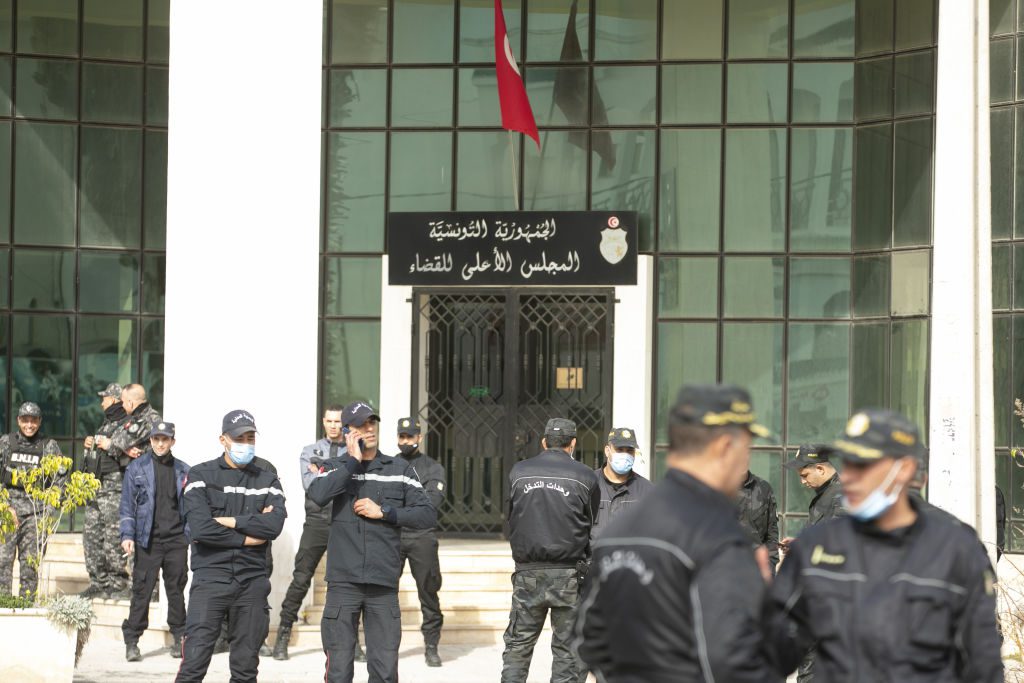President Kais Saied’s moves to shut down Tunisia’s High Judicial Council, an independent judicial oversight body set up after the country’s 2011 revolution to shield judges from government influence, pose a serious threat to judicial independence and fair trial rights in the country, Amnesty International said today.
In videotaped remarks to Tunisia’s interior minister and other officials on 5 February, Saied said that the High Judicial Council (HJC) “should consider itself a part of the past as of this moment” and announced his intention to dissolve the body by decree, accusing it of corruption and political bias. On 7 February, in a videotaped meeting with Head of Government Najla Bouden, he indicated to her that he considered the HJC to be dissolved, however, he has not yet issued a decree formally dissolving the body.
“President Kais Saied’s attack on the High Judicial Council represents a grave threat to fair trial rights in Tunisia. If the President enacts a decree to dissolve or suspend the institution, it will sound the death knell for judicial independence in the country,” said Heba Morayef Amnesty International’s Regional Director for the Middle East and North Africa.
“Since last July, President Saied has dismantled almost all institutional checks on his power. The HJC has stood as Tunisia’s last bastion of judicial impartiality.”
On 7 February, HJC president Youssef Bouzakher told Amnesty International that police had been deployed in front of the HJC’s office and had been there since the previous day, barring entry to HJC members.
Over recent months, President Saied has unleashed repeated verbal attacks on Tunisia’s civilian judiciary — including the HJC — which he has accused of being corrupt and of failing to respond swiftly to allegations of corruption and terrorism. Tunisian authorities have increasingly circumvented judicial procedures to impose arbitrary travel bans, house arrests and detentions on Tunisians, including judges and political figures, in violation of the rights to liberty and freedom of movement. Meanwhile, military courts have increasingly investigated and prosecuted civilians.
This is the first formal move President Saied has made against the independence of the judiciary as an institution since his July 2021 suspension of parliament and dismissal of then-Prime Minister Hichem Mechichi. On 22 September 2021, he suspended most of Tunisia’s constitution, formally granted himself near-total power to govern by decree, dissolved a temporary body to vet the constitutionality of laws, and barred anyone from challenging his decisions via Tunisia’s administrative court.
If the President [Kais Saied] enacts a decree to dissolve or suspend the institution, it will sound the death knell for judicial independence in the country.
Heba Morayef, Amnesty International
Under former dictator Zine El Abidine Ben Ali, the HJC – which oversees the appointment, disciplining, and career tracks of judges – served as a mechanism for executive influence on the judiciary. The executive branch appointed a majority of the HCJ’s members and the president himself also presided over the HJC, while the justice minister served as the HJC’s vice-president.
Following the revolution that toppled Ben Ali in January 2011, elected leaders transformed the then-discredited High Judicial Council into a bulwark of judicial independence. Under Tunisia’s 2014 Constitution and the 2016 law re-creating the HJC, two-thirds of the HCJ’s 45 members must be magistrates of whom a majority are elected by their peers. The remaining third of the HJC’s members are elected independent legal, financial, tax, and accounting experts.
The United Nations’ Basic Principles on the Independence of the Judiciary states that the independence of the judiciary “shall be guaranteed by the State and enshrined in the Constitution or the law of the country. It is the duty of all governmental and other institutions to respect and observe the independence of the judiciary.”
The UN Human Rights Committee has determined that executive branch interference in the judiciary — including control over the appointment and careers of judges — violates the right to trial by an “independent and impartial tribunal” as guaranteed by Article 14 of the International Covenant on Civil and Political Rights (ICCPR), which Tunisia has ratified.
While international law provides no single model for assuring independence of the judiciary, it encourages countries to create an authority to supervise the judiciary that is not dominated by the executive or legislature.
Amnesty International calls on President Kais Saied to scrap the plan to dissolve the High Judicial Council and cease all acts that may threaten judicial independence and/or violate people’s right to a fair trial.


